The Wholesome Journey - Group Nutrition Coaching Program
Mentorship Program, 1:1 Nutrition Coaching with Alison
What do you want to learn more about?
Program Login
Podcast Features
January 30, 2020
Alison Tierney, MS, RD, CD, CSO
Alison is a registered dietitian, board-certified in oncology nutrition, and a cancer thriver. Her expertise in oncology nutrition and personal experience with her own cancer diagnosis and its treatment provide her with the unique perspective of being able to relate to her clients on an entirely different level. Her content is consistently focused on evidence-based guidelines and seeks to increase the awareness of the power of nutrition to complement traditional cancer therapies.
- Alison Tierney, MS, RD, CD, CSO
- Alison Tierney, MS, RD, CD, CSO
- Alison Tierney, MS, RD, CD, CSO
- Alison Tierney, MS, RD, CD, CSO
- Alison Tierney, MS, RD, CD, CSO
- Alison Tierney, MS, RD, CD, CSO
- Alison Tierney, MS, RD, CD, CSO
- Alison Tierney, MS, RD, CD, CSO
- Alison Tierney, MS, RD, CD, CSO
- Alison Tierney, MS, RD, CD, CSO
- Alison Tierney, MS, RD, CD, CSO
- Alison Tierney, MS, RD, CD, CSO
- Alison Tierney, MS, RD, CD, CSO
- Alison Tierney, MS, RD, CD, CSO
- Alison Tierney, MS, RD, CD, CSO
- Alison Tierney, MS, RD, CD, CSO
- Alison Tierney, MS, RD, CD, CSO
- Alison Tierney, MS, RD, CD, CSO
- Alison Tierney, MS, RD, CD, CSO
- Alison Tierney, MS, RD, CD, CSO
- Alison Tierney, MS, RD, CD, CSO
- Alison Tierney, MS, RD, CD, CSO
- Alison Tierney, MS, RD, CD, CSO
- Alison Tierney, MS, RD, CD, CSO
- Alison Tierney, MS, RD, CD, CSO
- Alison Tierney, MS, RD, CD, CSO
- Alison Tierney, MS, RD, CD, CSO
- Alison Tierney, MS, RD, CD, CSO
- Alison Tierney, MS, RD, CD, CSO
- Alison Tierney, MS, RD, CD, CSO
- Alison Tierney, MS, RD, CD, CSO
- Alison Tierney, MS, RD, CD, CSO
- Alison Tierney, MS, RD, CD, CSO
- Alison Tierney, MS, RD, CD, CSO
- Alison Tierney, MS, RD, CD, CSO
- Alison Tierney, MS, RD, CD, CSO
- Alison Tierney, MS, RD, CD, CSO
- Alison Tierney, MS, RD, CD, CSO
- Alison Tierney, MS, RD, CD, CSO
- Alison Tierney, MS, RD, CD, CSO
- Alison Tierney, MS, RD, CD, CSO
- Alison Tierney, MS, RD, CD, CSO
- Alison Tierney, MS, RD, CD, CSO
- Alison Tierney, MS, RD, CD, CSO
- Alison Tierney, MS, RD, CD, CSO
- Alison Tierney, MS, RD, CD, CSO
- Alison Tierney, MS, RD, CD, CSO
- Alison Tierney, MS, RD, CD, CSO
- Alison Tierney, MS, RD, CD, CSO
- Alison Tierney, MS, RD, CD, CSO
- Alison Tierney, MS, RD, CD, CSO
- Alison Tierney, MS, RD, CD, CSO
- Alison Tierney, MS, RD, CD, CSO
- Alison Tierney, MS, RD, CD, CSO
- Alison Tierney, MS, RD, CD, CSO
- Alison Tierney, MS, RD, CD, CSO
- Alison Tierney, MS, RD, CD, CSO
- Alison Tierney, MS, RD, CD, CSO
- Alison Tierney, MS, RD, CD, CSO
- Alison Tierney, MS, RD, CD, CSO
- Alison Tierney, MS, RD, CD, CSO
- Alison Tierney, MS, RD, CD, CSO
- Alison Tierney, MS, RD, CD, CSO
- Alison Tierney, MS, RD, CD, CSO
- Alison Tierney, MS, RD, CD, CSO
- Alison Tierney, MS, RD, CD, CSO
- Alison Tierney, MS, RD, CD, CSO
- Alison Tierney, MS, RD, CD, CSO
- Alison Tierney, MS, RD, CD, CSO
- Alison Tierney, MS, RD, CD, CSO
- Alison Tierney, MS, RD, CD, CSO
- Alison Tierney, MS, RD, CD, CSO
- Alison Tierney, MS, RD, CD, CSO
- Alison Tierney, MS, RD, CD, CSO
- Alison Tierney, MS, RD, CD, CSO
- Alison Tierney, MS, RD, CD, CSO
- Alison Tierney, MS, RD, CD, CSO
- Alison Tierney, MS, RD, CD, CSO
- Alison Tierney, MS, RD, CD, CSO
- Alison Tierney, MS, RD, CD, CSO
- Alison Tierney, MS, RD, CD, CSO
- Alison Tierney, MS, RD, CD, CSO
- Alison Tierney, MS, RD, CD, CSO
- Alison Tierney, MS, RD, CD, CSO
- Alison Tierney, MS, RD, CD, CSO
- Alison Tierney, MS, RD, CD, CSO
- Alison Tierney, MS, RD, CD, CSO
- Alison Tierney, MS, RD, CD, CSO
- Alison Tierney, MS, RD, CD, CSO
- Alison Tierney, MS, RD, CD, CSO
- Alison Tierney, MS, RD, CD, CSO
- Alison Tierney, MS, RD, CD, CSO
- Alison Tierney, MS, RD, CD, CSO
- Alison Tierney, MS, RD, CD, CSO
- Alison Tierney, MS, RD, CD, CSO
- Alison Tierney, MS, RD, CD, CSO
- Alison Tierney, MS, RD, CD, CSO
- Alison Tierney, MS, RD, CD, CSO
- Alison Tierney, MS, RD, CD, CSO
- Alison Tierney, MS, RD, CD, CSO
- Alison Tierney, MS, RD, CD, CSO
- Alison Tierney, MS, RD, CD, CSO
- Alison Tierney, MS, RD, CD, CSO
- Alison Tierney, MS, RD, CD, CSO
- Alison Tierney, MS, RD, CD, CSO
- Alison Tierney, MS, RD, CD, CSO
- Alison Tierney, MS, RD, CD, CSO
- Alison Tierney, MS, RD, CD, CSO
- Alison Tierney, MS, RD, CD, CSO
- Alison Tierney, MS, RD, CD, CSO
- Alison Tierney, MS, RD, CD, CSO
- Alison Tierney, MS, RD, CD, CSO
- Alison Tierney, MS, RD, CD, CSO
- Alison Tierney, MS, RD, CD, CSO
- Alison Tierney, MS, RD, CD, CSO
- Alison Tierney, MS, RD, CD, CSO
- Alison Tierney, MS, RD, CD, CSO
- Alison Tierney, MS, RD, CD, CSO
- Alison Tierney, MS, RD, CD, CSO
- Alison Tierney, MS, RD, CD, CSO
- Alison Tierney, MS, RD, CD, CSO
- Alison Tierney, MS, RD, CD, CSO
- Alison Tierney, MS, RD, CD, CSO
Dairy Alternatives to Help you Reduce Dairy Intake
I need to make a few things clear before I share our favorite dairy alternative products.
One. I love(d) dairy, especially cheese! And in my opinion, there isn’t anything that completely mimics the flavor, texture, melty-ness and gooey-goodness of cheese made from cows.
Two. Just because a product is labeled “vegan” or “plant-based”, doesn’t make it a nourishing food. Many dairy free alternative products are highly processed, some with a laundry list of ingredients, and are still high in fat/oil.
Here at Wholesome, we focus on whole, unprocessed plant foods as much as possible because they are nutrient dense and filled with vitamins, minerals, phytochemicals, fiber, and antioxidants. Whole plant foods are the healthiest foods on the planet!
To be completely candid, we know it is difficult — near impossible — to eat a diet of 100% unprocessed foods (life is busy)! Adding some processed foods is not only more convenient, but can also be enjoyable.
Three. There is a lot of controversy out there regarding plant-bant based dairy alternatives being called “milk” or “cheese”. Yes, we agree that by definition milk is something that comes for the mammary gland of an animal such as a cow or goat. But for simplicity purposes, you’ll often find me referring to plant-based alternatives as “milk” or “cheese”.
Four. Many store bought dairy alternatives are expensive. Products like these often make it seem as though plant-based eating is a more expensive way of eating, which isn’t true. Simple, whole, plant-based ingredients are actually very inexpensive. Processed foods, meat, seafood, and dairy are typically what raise the grocery bill — not canned beans, dry rice, bananas, broccoli, etc. Thankfully, you can eat a well-rounded, completely nutritious plant-based lifestyle without any of these dairy alternatives or other “fake” animal products. But it’s always nice to have a little fun, right? (For our tips on saving money on groceries, click here.)
Now that I’ve addressed a few of these points, it’s time to share our favorite dairy alternatives for those who are seeking to reduce dairy or eliminate it all together.
1. Non-Dairy Milk
You’ll find several types of non-dairy milk in our house. In fact, almond, organic soy, and pea based milks currently occupy our fridge. Oat milk is also a regular.
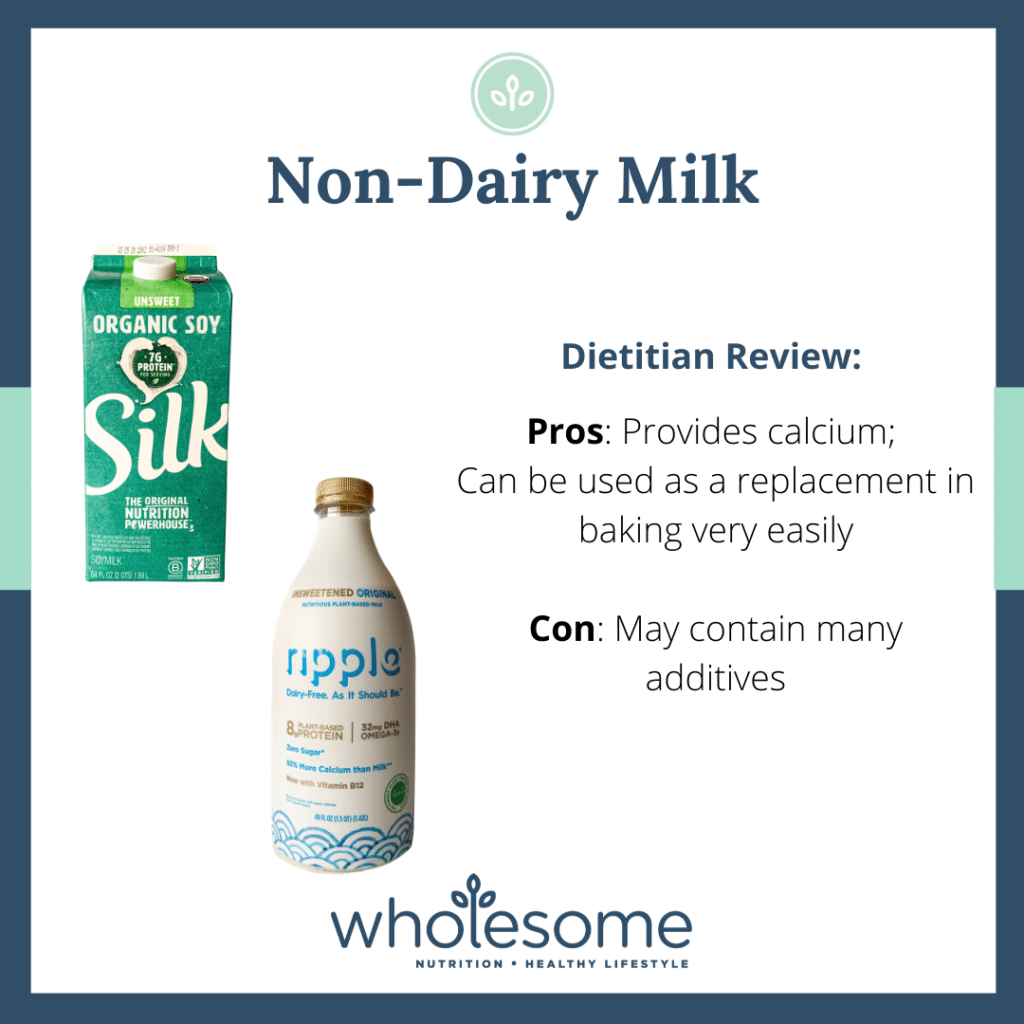
I am frequently asked if these alternatives are healthier. Truth be told, each plant-based milk boasts different advantages and potential downfalls in terms of nutrient composition, but then again, so does cow’s milk.
When it comes to my favorite alternative, I’m a big advocate for either organic soy or pea milk for the sake of nutrient composition. In terms of flavor, I actually prefer almond milk or oat milk.
What alternative is best for you? I recommend you choose based on what you are most looking for in a plant-based milk.
Looking for a closer nutrient comparison to cow’s milk without the saturated fat, hormones, or dairy protein?
Go towards organic soy or pea milk (e.g. Ripple).
Looking for an option closer to the creaminess of cow’s milk?
You might want to try oat milk.
Different brands have different tastes and flavor profiles. If you’ve tried one or two brands of plant-based milk and haven’t cared for them, keep exploring. Even some of my ‘pickiest’ clients have found a suitable alternative.
2. Cheese
I already know what you’re thinking…
There is nothing that can replace cheese made from cow’s milk. And I agree 100% with you. Most vegan cheeses don’t taste good and resemble plastic more than cheese.
After trying several different vegan cheeses, I had given up hope. But then I found one!
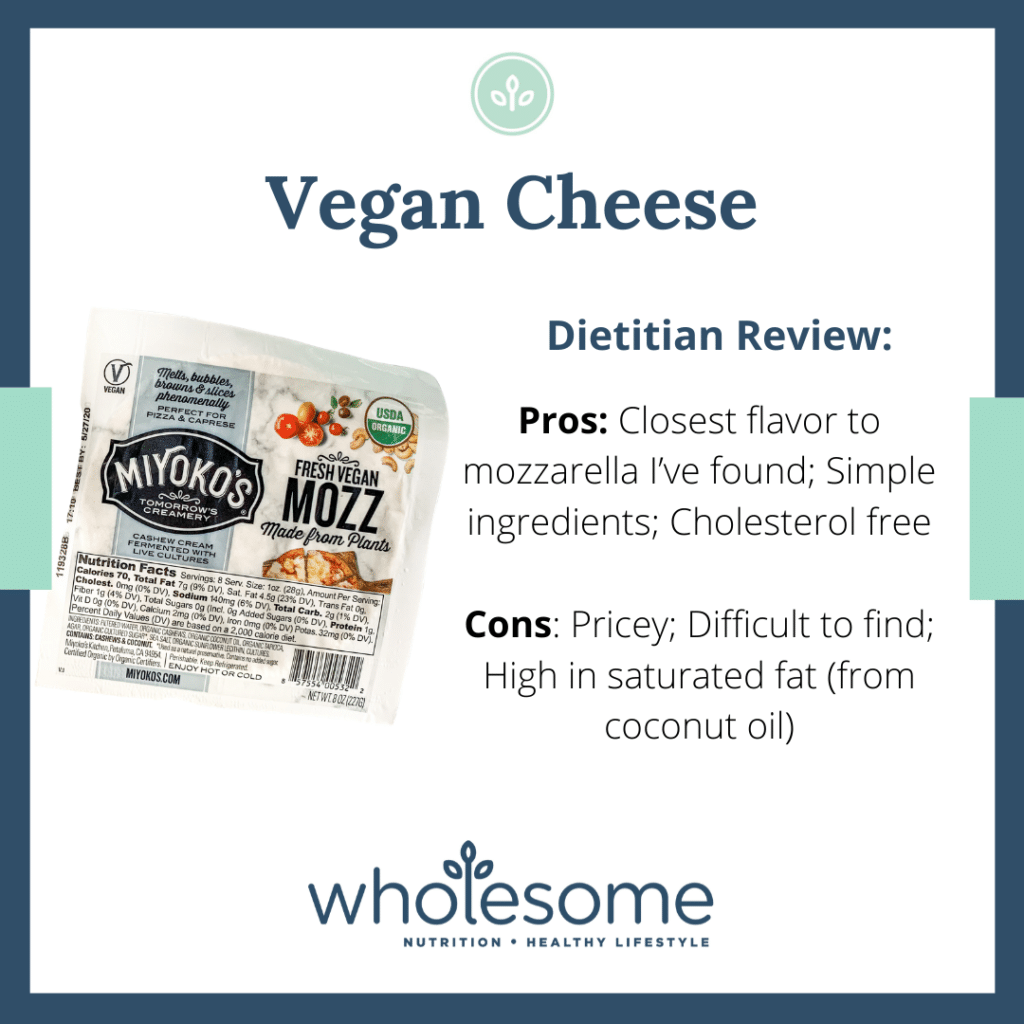
We made pizza. I took a bite, slowed my chew and thought “Oh my goodness, I think I’m eating cheese pizza!”
My favorite mozzarella alternative to recommend is Miyoko’s Vegan Mozzarella. This product is more like a traditional mozzarella di bufala (or, fresh mozzarella). It doesn’t have a laundry list of ingredients like other “fake cheese”. The main ingredient is cashews to create its creamy base. I love using this product as a treat. Use it to transform plant-based pizza or even grilled cheese for a delicious comfort food meal.
3. Butter
Dairy butter was frequently used in my family growing up — especially among my extended family. When having a meal with my grandfather, I used to ask him to butter my bread because I knew he would load it on.
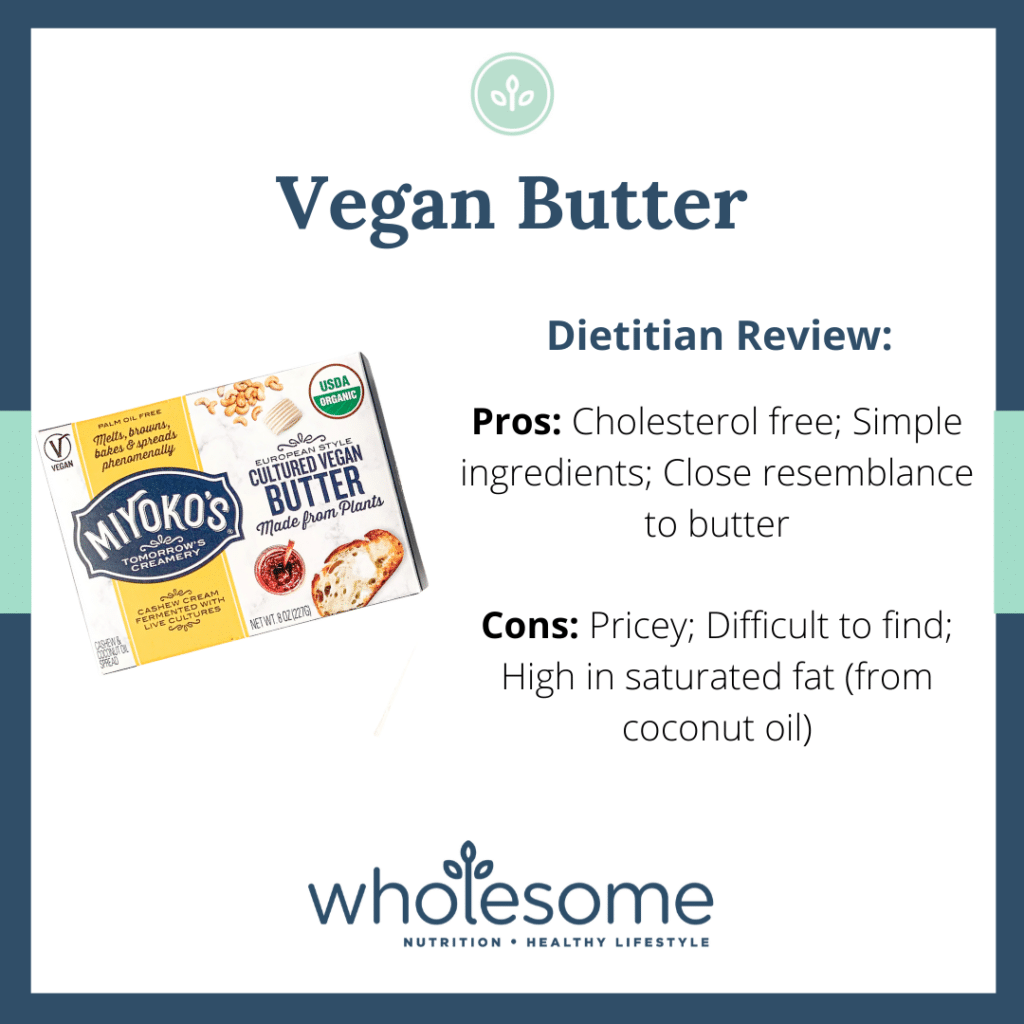
No wonder heart disease runs in the family…
I know what you’re thinking this time…one day butter is good, the next it is bad and then good again. The media makes the stance on butter (and other foods like eggs) confusing and frustrating for consumers. However, whether it is butter made from milk and vegan butter made from plant-oils, neither possess health promoting properties. Both should be used sparingly.
When it comes to a plant-based alternative to butter, Miyoko’s Vegan Butter is the closest flavor to cow’s butter I have found. But don’t be fooled, it still contains just as many calories and grams of saturated fat per serving than butter.
If you can’t find Miyoko’s, we also like Earth Balance which is easier to find. Plus, Earth Balance contains a better fat profile by containing less saturated fat than dairy and Miyoko’s butter.
4. Vegan Parm
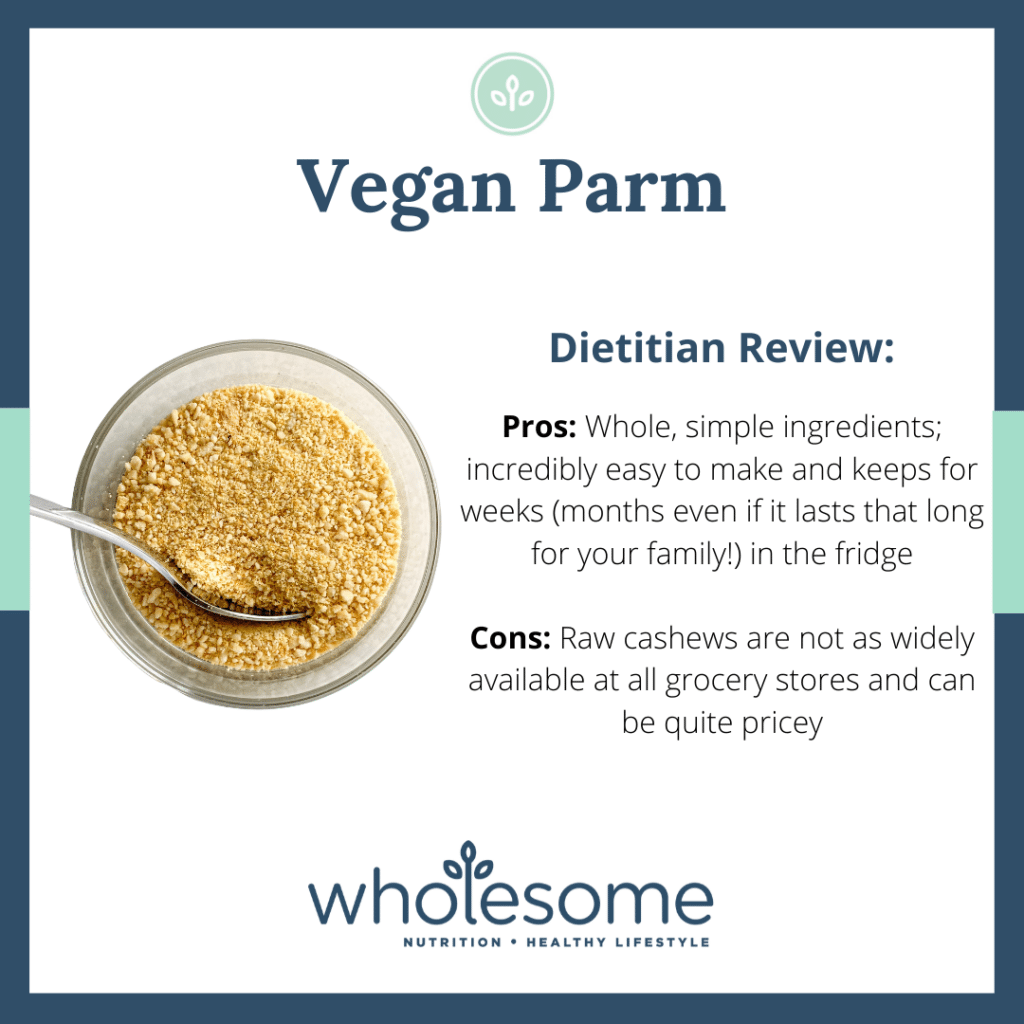
Ah, grated parmesan cheese from a green plastic jar. It was also a staple in our house growing up.
The ultimate comfort food was buttered noodles with grated parm! Buttered noodles with grated parmesan cheese reminds me of quick dinners before running off to practice.
When I first adopted a plant-based diet, I noticed some recipes called for nutritional yeast to mimic a cheesy flavor. I was very hesitant about nutritional yeast, or “nooch” as it is commonly referred to. But then, I tried Vegan Parm and it changed my world!
I love adding it to salads, tacos, pasta, pizza, and more! Now, I don’t even think about the green can parmesan. In fact, whole wheat noodles plus vegan parm (and no oil or butter) reminds me of my childhood buttered noodles and it makes me quite happy.
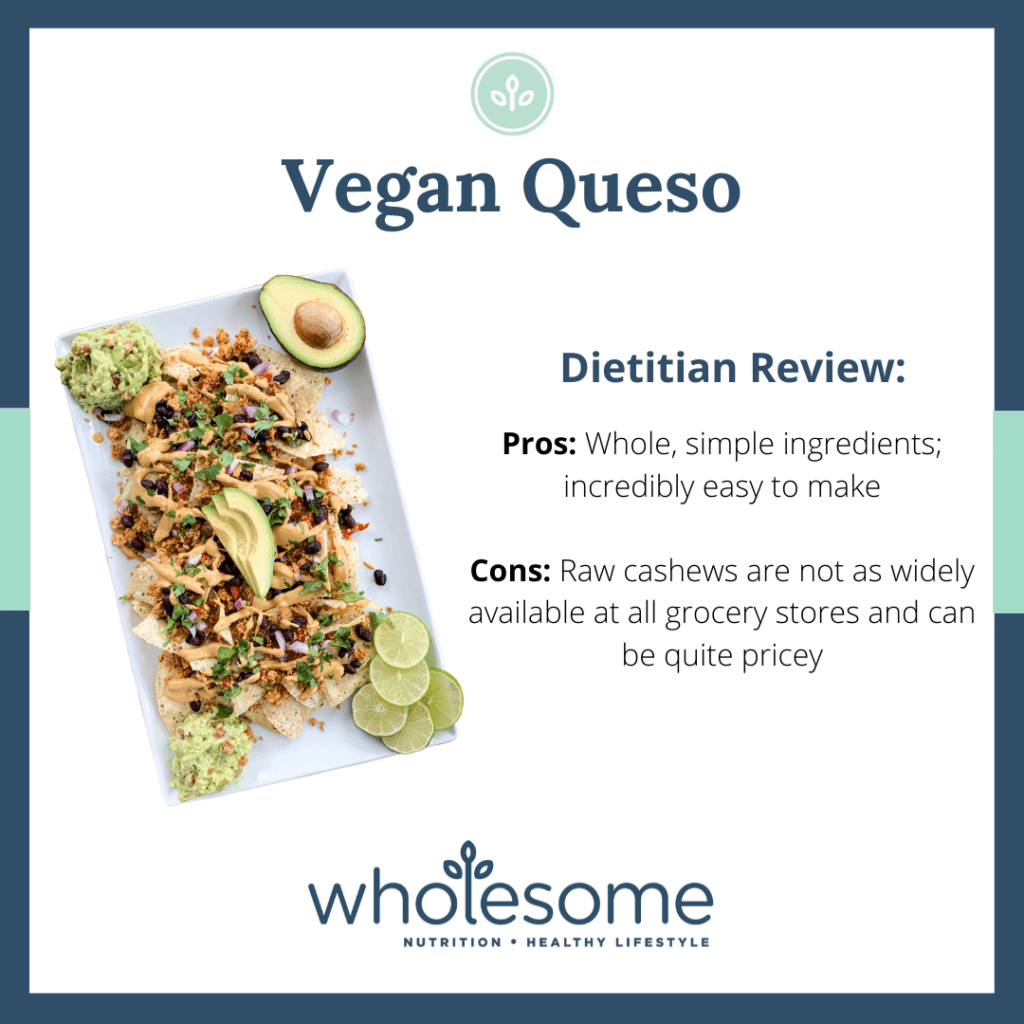
5. Vegan Queso
I can’t forget Vegan Queso.
I’ve purchased a few different jars of vegan queso before, but I was always disappointed. So, one day I decided to try making it myself. I nailed it (at least in my husband and even my far from vegan brother’s opinions!) and the recipe couldn’t be easier. I’ve used leftover queso for several dishes, not to mention, loaded vegan nachos!
Have you found delicious dairy alternatives? We’d love for you to share them with us in the comments below!
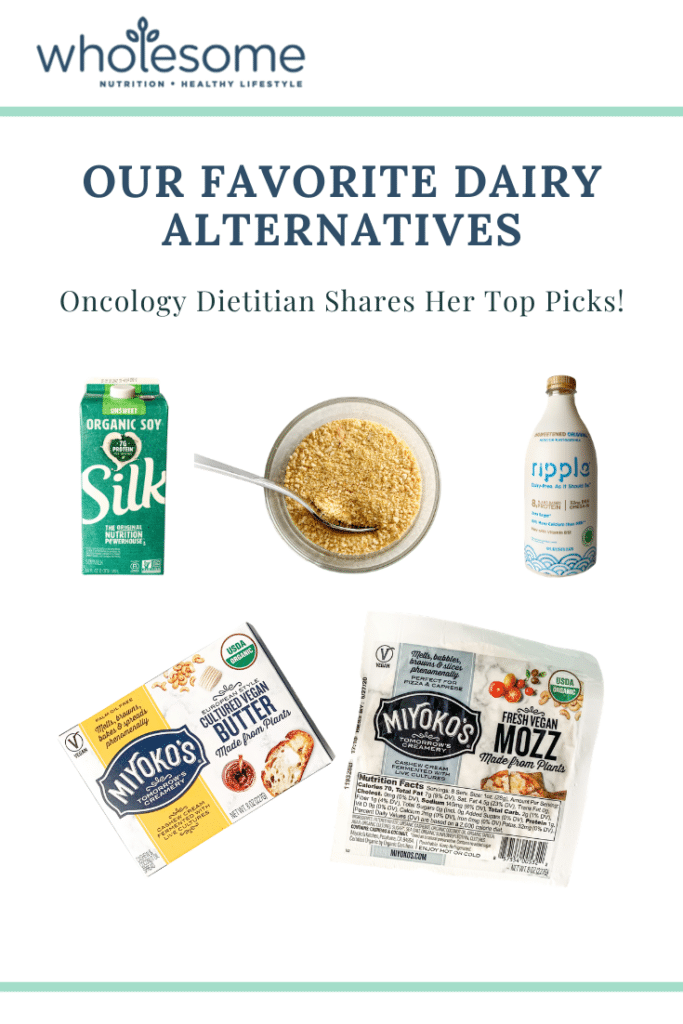
5 Delicious Dairy Alternatives
Leave a Reply Cancel reply
Featured Articles
Wholesome LLC is not a medical practice, and its employees cannot offer medical advice. This website provides educational information but it is not a substitute for medical advice from a licensed medical professional who is familiar with your particular facts and circumstances. The information contained on this website is not intended to diagnose, treat, or cure any disease and shall not be construed as medical advice. The information and education on this website is provided for you to use at your own discretion.
You can further review our disclaimer here.
Wholesome
About Alison
Courses & Programs
The Wholesome Journey
Free Resources
FAQs
Press & Media
Recipes
Blog
Contact Us
Shop
© 2026 Wholesome, LLC All rights reserved.
Privacy Policy
Terms of Use
Disclaimer
Mobile Terms of Service
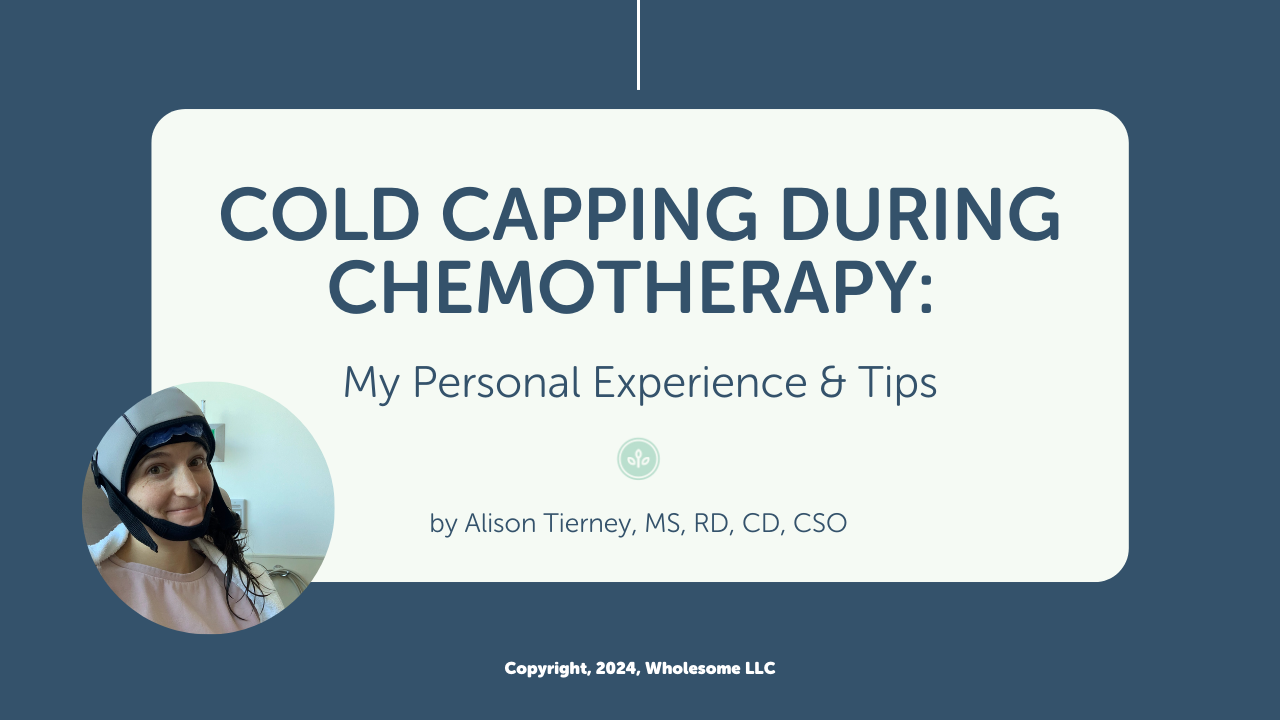
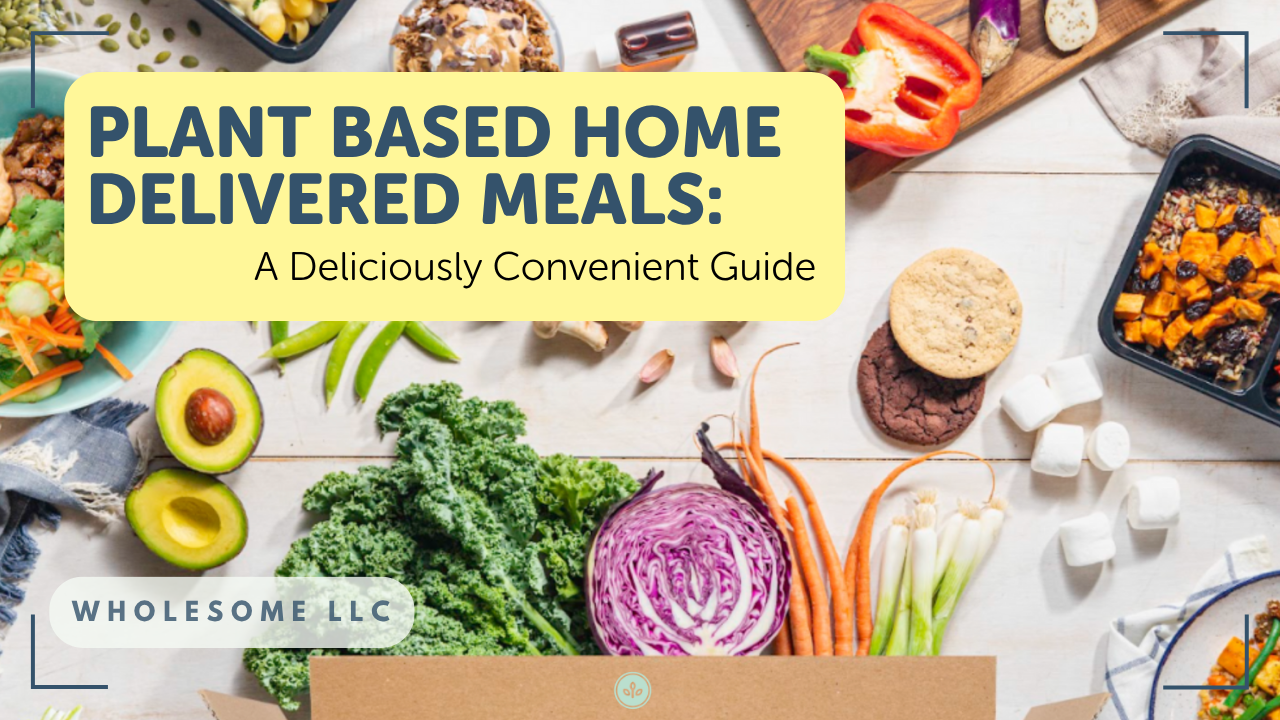
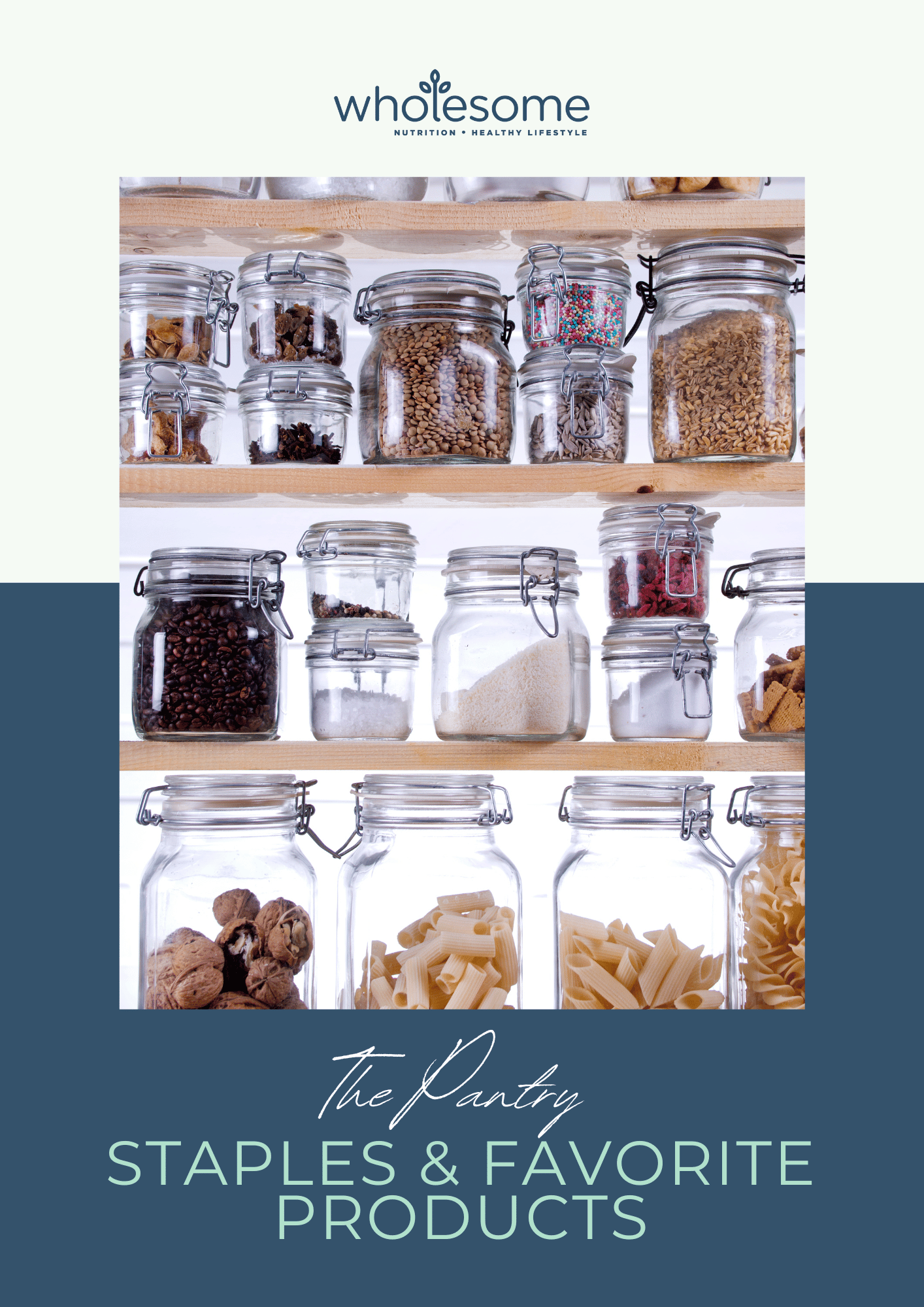
I have tried all these subsitutes and found it awful due also that I found out has other chemicals in these products Hence, I will go back to dairy in a very , very moderate way. Now I READ LABELS. Best of luck to you.
Hi Pam, thanks for stopping by! Our Vegan Parm and Vegan Queso are homemade and are made from simple, natural ingredients making them great alternatives. Best of luck to you as well.
LOVE Miyoko’s products!!
We’re also very lucky to have a couple lovely, local dairy-free cheesemakers in the Vancouver area (Blue Heron Creamery & Black Sheep Vegan Cheeze). They make delicious spreadable cheeses.
Hi Cindy! Thanks for stopping by!
We love the Miyoko’s too! Those spreadable cheeses sound fantastic. I would love to try them some day!
I love Myoko’s but Treeline Herbed soft cheese spread taste like a true boursin cheese, and their aged cheese do taste like an aged dairy cheese. Clean ingredients, truly addictive 🙂
I haven’t tried the Treeline! Thanks for sharing!